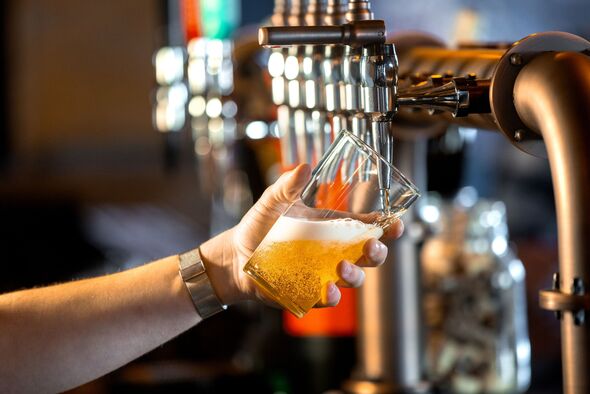
The warning comes on the back of a change in the law on October 1 (Image: Getty)
Three in four hospitality businesses, including pubs and bars, are set to impose a service charge for simple tasks like serving a pint of beer.
The warning comes on the back of a change in the law on October 1 which means firms will no longer be able to grab a slice of the tips left for staff by customers across hospitality from pubs and restaurants to pizza places and hotels.
New research suggests an astonishing 74 percent of hospitality businesses plan to combat the change by imposing a new service charge – on top of any tips for staff – that they will use to help cover their business costs.
The research was conducted by the hospitality tech firm ‘three rocks’, which has worked with famous name chains such as Pizza Hut, TGI Fridays and The Big Table Group, whose brands include Bella Italia, Banana Tree, Amalfi Ristorante, Las Iguanas and Frankie & Benny’s.
It said: “Nearly three quarters (74 percent) of UK hospitality companies either already, or plan to, add a service charge as standard for smaller tasks such as serving a pint, preparing a cocktail, checking people in or carrying luggage.
“Nearly one in three operators will add a service charge of between 5-10 per cent for such tasks, suggesting that the UK is heading towards an American-style service charge, where 20 percent is the standard gratuity for all types of service.”
Introducing service charges of 5-10 percent to a pint of beer, where the average UK price is £4.98, would come in between 25p and 50p. However, taking the same approach as the Americans could mean adding a £1 service charge to a pint.
A string of bars and pubs in Scotland, owned by The Scotsman Group, have started to levy a smaller automatic 2 percent service charge on drinks. For example, a pint of Camden Hells Lager at The Grosvenor Cafe in Glasgow, is listed on the drinks menu as £5.95, however customers ordering at the bar are actually charged £6.07.
The new rules are part of the Employment (Allocation of Tips) Act 2023, which was introduced by the last government to stop unscrupulous hospitality businesses from snatching tips that customers wanted to go to staff for offering good service.
The law is predicted to boost the income of some 4m workers and requires hospitality businesses to distribute 100 percent of customer tips and service charges to staff, with no exceptions other than standard-rate tax deductions. The changes also make it mandatory for all hospitality businesses to have a written policy accessible to staff on how tips are dealt with at their place of work.
However, most firms intend to get around the new law by introducing the service charge, on top of any tip, that they can keep for themselves.
A survey by three rocks found the majority of hospitality businesses – two in three (63 percent) – currently take a percentage of tips from employees.
It said some three in ten (29 percent) use these tips to cover costs such as card processing fees, and now the businesses will have to find other ways to cover these costs with most opting to add a service charge.
Making sure 100 percent of tips go to often poorly paid hospitality staff will be welcomed by the workers themselves and customers. However, three rocks said the businesses will lose around £12,000 a year for individual outlets through to £60,000 for small chains and as much as £360,000 for large hospitality groups.
As a result, the firm said a number of struggling businesses may be forced to close. Just this week TGI Fridays went into administration under a move that could cost 4,000 jobs.
The research by three rocks involved a survey of 1,000 hospitality businesses, 1,000 customers and 500 staff to gain their insight into the new government legislation and to understand feelings towards tipping. It included hospitality businesses of all sizes, from independent operators to national restaurant, pub and bar chains.
The study found more than four in ten (43 percent) businesses favour establishing a Tipping Standard Practice, an official tip amount implemented ‘across the board’ for customers and a standard process for businesses to distribute tips to staff.

The research was conducted by the hospitality tech firm ‘three rocks’ (Image: Getty)
An overwhelming 73 percent of the 1,000 customers polled agreed this was a good idea. At the same time, some 59 percent of staff support the concept, with 27 percent saying it would make financial planning easier and a further fifth saying it would be a fairer system for everyone.
Perhaps surprisingly, three rocks said: “The British public also support the Americanisation of tips, with 73 percent of customers agreeing that people should tip when buying drinks at a bar and over a third (34 percent) saying they should tip bar staff between 10-20 percent for making their drinks.”
Scott Muncaster, founder and MD of three rocks, said: “The UK hospitality industry is struggling, and recent government intervention has done nothing to ease concerns from operators.
“This new legislation, set to come into force in October, will massively increase costs as our research has shown.
“This, coupled with reports of an outdoor smoking ban proposed by the new Labour government, is cause for concern, and may push many businesses to breaking point in the final quarter of this year and beyond.”
Unite wins
In 2018, members of the Unite union working at TGI Fridays took historic strike action to win a fairer tips policy. And in 2022, workers at Cameron House, the luxury resort at Loch Lomond, in Scotland, won back £138,000 in unpaid tips and service charges when it was discovered that their employer had not been transparent or fair with distribution.
Sharon Graham, Unite General Secretary, said: “If employers think they can continue to get away with failing to give workers their tips … they need to think again. Unite will use every avenue to ensure our members secure pay and tip justice.”
















